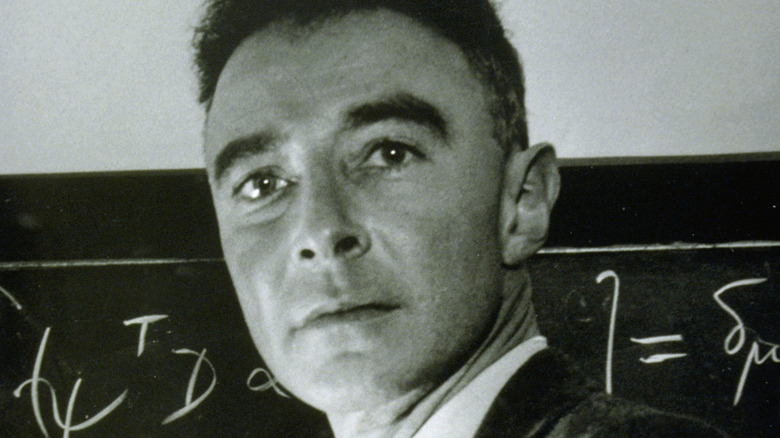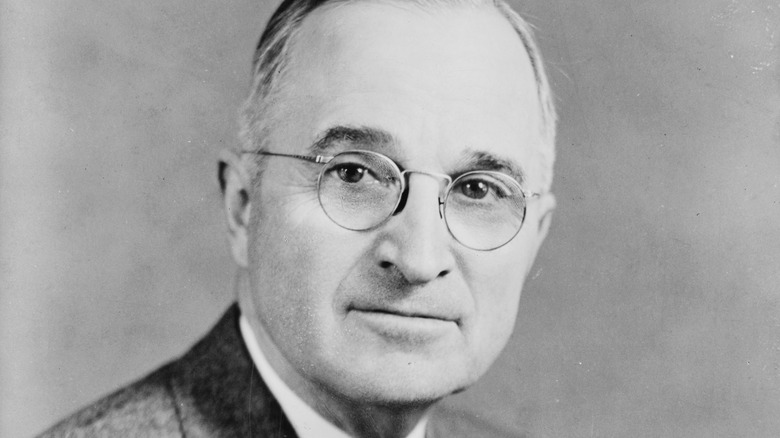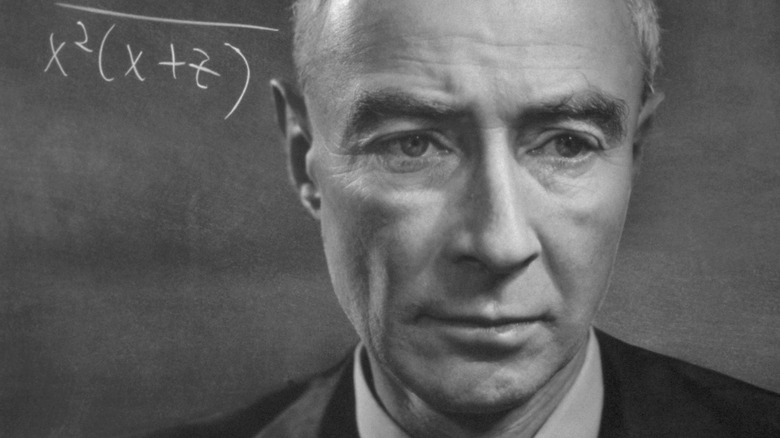The Real Reason Harry Truman Turned On Oppenheimer After WWII
On October 25, 1945, J. Robert Oppenheimer met for the first and only time with President Harry Truman, and by most historical accounts, Oppenheimer failed to make a good first impression on the president. In their Oval Office meeting, the theoretical physicist told the president he had blood on his hands — referring to himself — for the role he played in the development of the atomic bomb (A-bomb). Truman then told Secretary of State Dean Acheson he never wanted to see "that son of a b**** in this office again."
Beginning in 1943, Oppenheimer oversaw the design and development of the world's first A-bomb at Los Alamos Laboratory in New Mexico as part of the Manhattan Project, authorized by President Franklin Roosevelt, Truman's predecessor. Under Truman, two atomic bombs were dropped on Japan, ending World War II in the Pacific theater. Early on in the bomb's development, some — including Oppenheimer — thought the terrible power of atomic weaponry could deter future international conflict. By 1945, though, when Oppenheimer and Truman met, the "father of the atomic bomb," as Oppenheimer is sometimes called, feared the opposite had come to pass (per Biography).
'The blood is on my hands'
Though President Harry Truman would give J. Robert Oppenheimer a presidential citation and Medal for Merit for his work on the Manhattan Project in 1946, after their sole 1945 meeting, Oppenheimer was effectively cut out of Truman's inner circle for the development, safety, and management of atomic weaponry. When Oppenheimer mentioned having blood on his own hands, Truman reportedly responded that if anyone had blood on his hands it was the president. "[T]he blood is on my hands, let me worry about that," Truman said (via Newsweek).
According to Truman, the authorized use of two atomic bombs to end the war with Japan saved countless future lives, justifying the decision — a notion the 33rd U.S. president clung to throughout his life. After Nagasaki was bombed, though — the second of two U.S. attacks — Oppenheimer's views changed. Distressed at the sheer scope of the destruction, by the time Oppenheimer and Truman met face to face, the scientist hoped international cooperation might keep atomic weaponry under control.
Oppenheimer was dismayed, then, when Truman seemed intent on keeping nuclear technology a secret from the Soviets. Beginning in 1944, efforts were already underway to keep the fearsome power of atomic weaponry exclusive to U.S. interests. Oppenheimer felt that was impossible, and by attempting to do so, an arms race would inevitably erupt between the two countries. For those concerns, Truman would reportedly call Oppenheimer the "cry-baby scientist."
Oppenheimer spoke out against atomic weaponry later in life
As time went on, J. Robert Oppenheimer spoke out against the proliferation of the nuclear weapons he had a hand in creating. Shortly after his 1945 meeting with President Harry Truman in the Oval Office, Oppenheimer told the Association of Los Alamos Scientists (via Newsweek), "There was a period immediately after the first use of the bomb when it seemed most natural that a clear statement of policy, and the initial steps of implementing it, should have been made; and it would be wrong for me not to admit that something may have been lost, and that there may be tragedy in that loss."
Oppenheimer did serve on the General Advisory Committee to the U.S. Atomic Energy Commission, but by 1954, McCarthyism caught up with the scientist, and his security clearance was revoked for purported ties to communism. Chastened by his World War II experience, Oppenheimer also opposed the development and testing of the even more powerful hydrogen bomb, further distancing himself from the political establishment — tensions rooted in that one and only fateful 1945 meeting between Truman and Oppenheimer in the White House Oval Office (via History).


